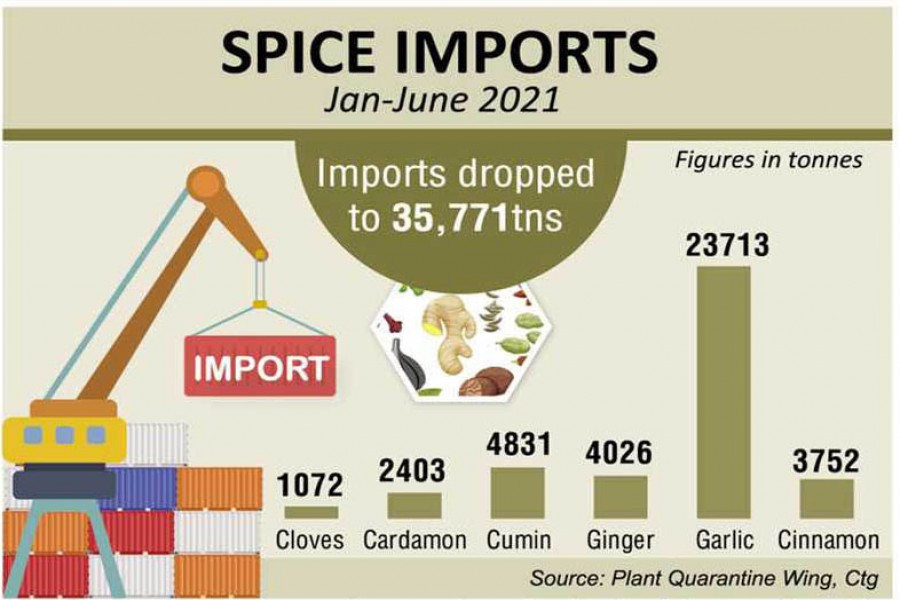Bangladesh's spice import falls as pandemic saps hospitality demand

Published :
Updated :

Spice import plummeted as demand for the cooking ingredients shrank amid corona prohibition on international and internal tours and hospitality as well as consumption restraint.
The import volume of mostly-consumed spices dropped to 35,771 tonnes during the January-June period of this calendar year, down by around 30 per cent from the previous corresponding period, according to the Plant Quarantine Wing of the Department of Agriculture.
The agricultural department monitors the import of spices and herbs in order to prevent introduction of quarantine pests into Bangladesh from other countries.
The mass-consumed spices are cloves, cardamom, cumin, ginger, garlic and cinnamon.
Local spice importers procured cloves worth 1072 tonnes in period under review, cardamom 2403 tonnes, cumin 4831 tonnes, ginger 4026 tonnes, garlic 23713 tonnes and cinnamon 3752 tonnes.
These are the big-volume imports that entered the country through Chittagong seaport. There are some imports through land ports from India and Myanmar.
The wing says in a note that the drop is due to the pandemic as the demand for the flavouring items has fallen for the prolonged pandemic and lockdowns.
It said that social programmes including weddings remained almost suspended due to the pandemic that upended normal order with the threat of infection and death.
Md Nasir Uddin, deputy director at the quarantine wing in Chattogram, said that hotels and restaurants remained shut during the pandemic and lockdowns leading to fall in the import of spices.
But, he said, there was no supply disruption to the local market and prices were affordable.
Mr Nasir estimates that the fall is around 30 per cent compared to that of the corresponding period.
Md Enayet Ullah, president of Bangladesh Spices Wholesale Merchants Association, a group of around 300 importers and traders, told the FE that the business is badly impacted by the pandemic.
"Our business depends on the social programmes but that remained almost shut for more than one year."
Utpal Chowdhury, proprietor of a spice-importing entity, MU Brothers, at Khatunganj in Chattogram, told the FE that the demand for spices remained poor over the past one year.
He said the coronavirus pandemic has thrown this trade into disarray, closing restaurants and slashing consumer spending.
"I import all kinds of spices, but there has been no demand for the same for long."
He said: "Lockdown has been withdrawn but the situation will not improve shortly."
He finds another constraint on the spice trade. Import turns expensive following a new order issued by the National Board of Revenue (NBR).
The NBR orders sending all imports to private depots to ease congestion at the Ctg port, but the handling cost at the private facilities is higher.
Cloves usually come from China, Indonesia, Madagascar, Sri Lanka, India and the United Arab Emirates (UAE).
Local Importers procure cardamom from Guatemala, India, and Singapore.
Cumin comes from India, the UAE, Egypt and Turkey. Ginger hails from China, India and Thailand.
Garlic comes only from China while Cinnamon from China and Vietnam.
However, Bangladesh Bank statistics show the import of spices grew by 15 per cent to US$404 million in July-June 2020-21.
Traders say spices have vast definition. It includes some essentials like onions, turmeric and dried peppers.
They said that the prices of onions had fluctuated on the international market in the last fiscal year.
They import mainly spices having aromatic mixtures of spices popularly called 'Garam Masala'.
jasimharoon@yahoo.com


 For all latest news, follow The Financial Express Google News channel.
For all latest news, follow The Financial Express Google News channel.